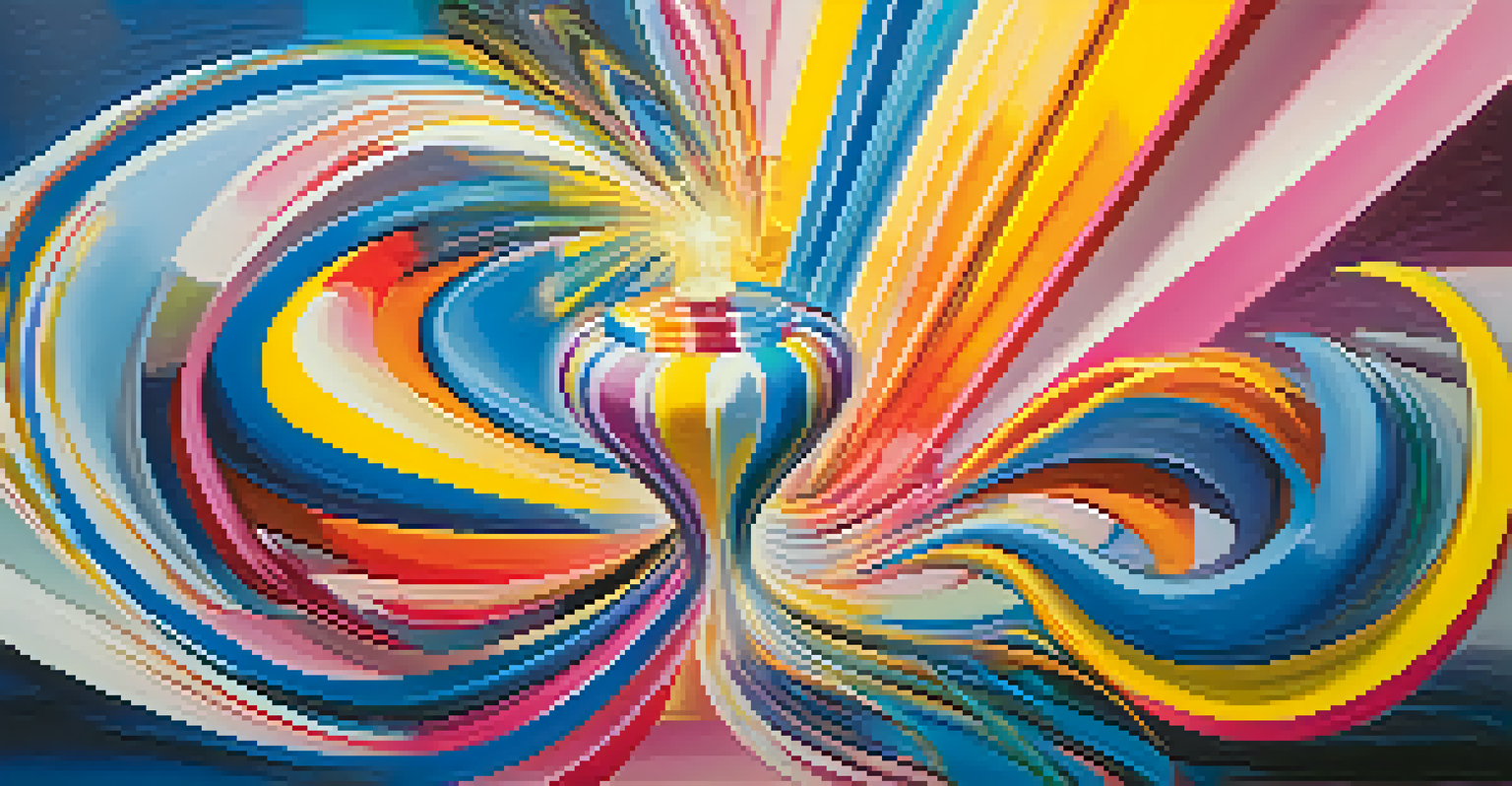Cognitive Effects of Hallucinogens on Thought Patterns

Understanding Hallucinogens and Their Effects
Hallucinogens are substances that alter perception, mood, and cognitive processes. Common examples include LSD, psilocybin, and mescaline. These substances can lead to profound shifts in how individuals experience reality, often described as 'trips'.
Hallucinogens can help us see the world through a different lens, often revealing connections and insights previously hidden from our conscious mind.
When ingested, hallucinogens can disrupt the normal functioning of neurotransmitters, particularly serotonin, which plays a crucial role in mood and perception. This disruption can lead to a variety of cognitive effects, from enhanced creativity to distorted thought patterns. Understanding these effects can help us grasp their broader implications on mental health and cognition.
It's essential to differentiate between various hallucinogens, as their effects can vary significantly. For instance, while LSD may lead to intense visual hallucinations, psilocybin might foster deep introspection. This diversity in effects sets the stage for exploring how these substances influence thought processes.
How Hallucinogens Alter Thought Patterns
Hallucinogens can fundamentally change how we think and perceive the world around us. Users often report a sense of interconnectedness and a shift in their thought processes, leading to novel ideas and insights. This creative boost is one reason some artists and thinkers have turned to these substances for inspiration.

However, the changes in thought patterns can also include disorganized thinking or difficulty focusing. Some users find it challenging to maintain a coherent train of thought, which can lead to confusion. This duality—enhanced creativity alongside potential cognitive chaos—highlights the complexity of hallucinogens' effects.
Hallucinogens Alter Perception
These substances can significantly change mood and cognitive processes, leading to profound shifts in how reality is experienced.
Moreover, the subjective nature of these experiences means that two individuals may react very differently to the same substance. This variability can be influenced by factors such as dosage, environment, and individual psychology, making it crucial to approach hallucinogen use with caution.
The Role of Neurotransmitters in Cognitive Effects
Neurotransmitters are chemical messengers that transmit signals in the brain, and hallucinogens primarily affect serotonin receptors. By binding to these receptors, hallucinogens can significantly alter perception and mood, leading to varied cognitive effects. This interaction is a key factor in understanding how these substances impact thought patterns.
The mind is like a parachute. It doesn’t work if it isn’t open.
For example, the activation of serotonin receptors can lead to increased emotional responses and altered sensory perception. Users often report intensified colors, sounds, and even tactile sensations. These changes can create a kaleidoscope of experiences that shift their cognitive frame, fostering new insights and perspectives.
However, the impact on thought patterns is not solely positive. Overstimulation of neurotransmitter systems can lead to anxiety or paranoia in some users. This highlights the importance of considering both the potential benefits and risks associated with hallucinogen use.
Increased Creativity and Problem-Solving Abilities
One of the most discussed cognitive effects of hallucinogens is their potential to enhance creativity. Many users report experiencing 'aha' moments, where creative solutions to problems suddenly become clear. This phenomenon can be particularly appealing for artists, musicians, and writers seeking to push their creative boundaries.
Research has suggested that the altered state of consciousness induced by hallucinogens can lead to a unique mode of thinking. This includes associative thinking, where connections between seemingly unrelated ideas emerge more easily. It’s as if the brain is rewiring itself temporarily to explore new pathways.
Creativity Boost from Hallucinogens
Many users report enhanced creativity and novel insights, though experiences vary greatly among individuals.
However, while some individuals may find this boost in creativity beneficial, it's essential to recognize that not everyone experiences this effect. The variability in personal experiences means that hallucinogens may not serve as a one-size-fits-all solution for enhancing cognitive abilities.
Potential Risks Associated with Hallucinogen Use
Despite the intriguing cognitive effects, there are notable risks associated with hallucinogen use. Some individuals may experience negative psychological effects, such as anxiety, paranoia, or even psychosis. These adverse reactions can be exacerbated by the intensity of the experience, leading to challenging situations.
Moreover, the unpredictability of hallucinogens can lead to a phenomenon known as 'bad trips'. During these experiences, users may feel overwhelmed by fear or confusion, which can have lasting psychological impacts. It's crucial for anyone considering hallucinogen use to be aware of these potential risks and to approach the experience with caution.
Responsible use, including ensuring a safe environment and having a trusted individual present, can help mitigate some of these risks. However, it’s essential to highlight that hallucinogens are not suitable for everyone, particularly those with a history of mental health issues.
Therapeutic Applications of Hallucinogens
In recent years, there has been a resurgence of interest in the therapeutic potential of hallucinogens. Studies suggest that substances like psilocybin and MDMA may have beneficial effects on mental health disorders, including depression, PTSD, and anxiety. This has led to a reevaluation of the stigma surrounding these substances.
Therapeutic settings often emphasize controlled environments, where patients can explore their thoughts and feelings safely. In these contexts, hallucinogens may facilitate profound insights, leading to breakthroughs in understanding personal issues. This therapeutic approach contrasts sharply with recreational use, where outcomes can be unpredictable.
Risks of Hallucinogen Use
Despite potential benefits, hallucinogen use carries risks such as anxiety, paranoia, and unpredictable experiences.
While promising, it is crucial to approach this area of research with a balanced perspective. More studies are needed to understand the long-term effects and the best practices for utilizing hallucinogens in therapy. However, the initial findings are encouraging and could pave the way for new treatment modalities.
Conclusion: Balancing Exploration and Caution
The cognitive effects of hallucinogens on thought patterns are a fascinating area of study. From enhanced creativity to potential therapeutic applications, these substances offer intriguing possibilities. However, the risks and unpredictable nature of their effects remind us to proceed with caution.
As society becomes more open to discussing and researching these substances, it’s essential to foster informed conversations. Understanding both the benefits and the risks can empower individuals to make educated decisions regarding hallucinogen use. Education plays a vital role in demystifying these experiences and promoting responsible use.

Ultimately, while hallucinogens present exciting opportunities for exploration and understanding of the mind, they also require a balanced approach. By prioritizing safety and awareness, we can navigate the complex landscape of cognitive effects brought about by these substances.